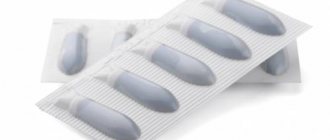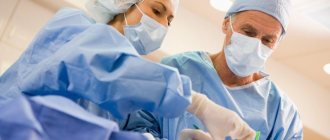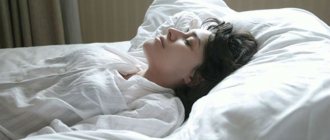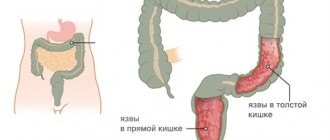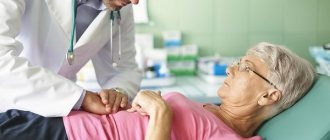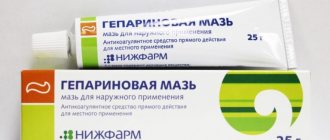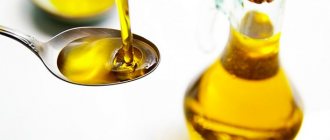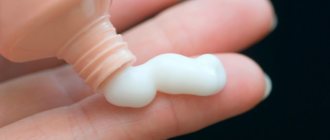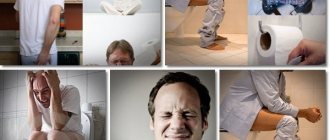Photo of acute hemorrhoids.
There are several reasons for the worsening of the disease - long-term ignorance (due to ignorance or negligence) of internal hemorrhoids, and neglect of doctors’ recommendations during its chronic form. Often acute pain appears completely unexpectedly. This means that the patient simply did not notice the previous stage of the disease and did not receive timely treatment. But if you are struck by acute hemorrhoids, the symptoms will not keep you waiting.
They manifest themselves so clearly that this has become its identifying feature, the appearance of which requires immediate medical intervention.
Causes of acute hemorrhoids
Since the exacerbation of the disease is preceded by a calmer stage, anyone who suffers from hemorrhoids should be aware of the dangerous factors that lead to a worsening of the disease.
- The first reason is the consumption of too hot, salty or spicy foods, marinades, smoked foods and alcohol. All of the above products are dangerous because when they are consumed, blood flow to the pelvic organs is stimulated. Violation of the diet in acute hemorrhoids often leads to an exacerbation of the disease.
- The second reason is indigestion. This also happens as a result of a violation of the diet, which in case of hemorrhoids involves the consumption of foods containing raw fiber. These are bran, vegetables, fruits and, of course, fermented milk products. Their use stabilizes the digestive tract, reduces the likelihood of constipation and diarrhea. After all, both the first and second often lead to problems with the nodes and cause exacerbation of the disease.
- The third reason is lack of physical activity. With a disease such as hemorrhoids, sitting or standing for long periods of time is extremely harmful and can also cause exacerbations. This happens due to stagnation of blood in the veins of the pelvis, and this can be avoided with the help of physical activity. Even if your job involves sitting still, find ways to get up, walk, and stretch. It will take a little time, but it can protect you from worsening your condition.
- The fourth reason is heavy lifting. This is one of the main factors leading to exacerbation of hemorrhoids. After all, lifting objects that are too heavy for you leads to knots falling out.
Symptoms, signs of acute hemorrhoids
The symptoms of acute varicose veins of hemorrhoidal veins are quite varied, but the main symptom is pain. Pain during an aggravated pathological process is jerking, pulsating, and occurs with any action or movement.
Bleeding develops when a thrombosed or strangulated hemorrhoidal node ruptures.
The pain is sharp, but quickly disappears, however, even in such a short time (from a couple of seconds to several minutes) it gives the person multiple unpleasant sensations. It is painful to move, sit and even sneeze; it is impossible to go to the restroom.
Signs of worsening hemorrhoids are as follows:
- acute internal hemorrhoids are not noticeable to the naked eye, but upon palpation a tightness is felt, and the very touch leads to excruciating pain;
- acute external hemorrhoids are clearly visible upon examination, since the nodule is inflamed, swollen, dense, bluish and painful;
- bleeding develops when a thrombosed or strangulated hemorrhoidal nodule ruptures. In this case, the pain decreases, the person’s condition improves somewhat, and it seems that the illness has gone away.
When the body is intoxicated, the temperature rises, the patient develops a fever, weakness appears, and vomiting occurs. In general, the general condition is rapidly deteriorating.
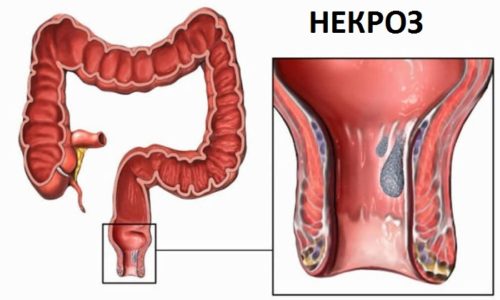
At stage 3 of thrombosis, the nodes become cyanotic, ulcers appear, and a necrotic process is possible.
The severity of symptoms depends on the degree of acute pathological process. Proctologists distinguish 3 stages of thrombosis of hemorrhoidal nodules:
- first - a blood clot forms, which is accompanied by acute pain, swelling, mild redness of the anorectal area, itching and burning, but there is no significant inflammation yet;
- second - the inflammatory process affects only the hemorrhoidal node, swelling is more pronounced, spasm of the anal sphincter and redness around it appear. Touching the nodules is accompanied by severe pain;
- third, the inflammatory process spreads not only to nearby areas, but also to the subcutaneous fat. A person feels incredible pain both in the anorectal area and in the perineum. The nodes become cyanotic, ulcers appear, and a necrotic process is possible.
Similar symptoms can occur in any category of patient. This pathological condition also affects expectant mothers, since pregnancy can become another risk factor for the formation of acute hemorrhoids.
Treatment of acute hemorrhoids during pregnancy should begin immediately to eliminate possible complications and the use of potent drugs that can harm the baby in the womb.
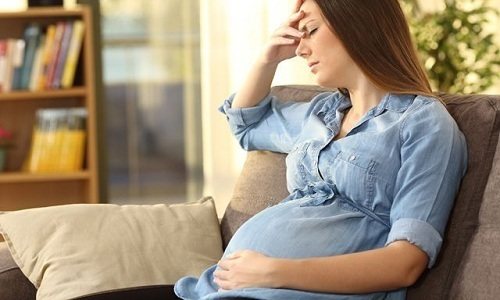
Treatment of acute hemorrhoids during pregnancy should begin immediately to eliminate possible complications.
Treatment procedures for acute hemorrhoids
What to do for acute hemorrhoids? - you ask. Of course, treat it immediately! Treatment for acute hemorrhoids, of course, takes more time and effort than its prevention. It is especially difficult to eliminate complications in severe stages of the disease. But if, nevertheless, there is a need for medical intervention, you should know that only complex therapy will be most effective in combating the disease. It should consist of therapeutic procedures and the use of medications.
The first problem, which immediately becomes the most pressing, is relieving pain and eliminating inflammation. After all, unpleasant sensations are sometimes very strong and it is extremely problematic to endure them, and there is no need!
Treatment
The tactics of complex conservative treatment of pathology will depend on the presence and severity of certain symptoms. The question of what to do and how to eliminate the exacerbation of the pathology will be decided by the proctologist, taking into account many factors.
To treat the acute phase, doctors use:
- Painkillers are prescribed to relieve pain. They effectively and quickly cope with pain and improve the patient's condition. These include: general analgesics - Nise, Diclofenac, Ketonal and so on; combined topical agents - Ultraproct suppositories, Anuzol, Gepatrombin G, Procto-Glivenol and others.
- Local anti-inflammatory drugs are prescribed if the inflammatory process has spread to the subcutaneous tissue and tissue surrounding the hemorrhoidal lump. Effective medications are Levomekol ointment, Levosin and others. In case of development of node thrombosis, the use of Heparin and Troxevasin ointment is recommended.
- Venotonic drugs help resolve blood clots and thin the blood: Heparin, Hepatrombin. The effectiveness of treatment of acute hemorrhoids increases with the simultaneous intake of venotonic drugs: Detralex is considered the best.
- Adrenaline suppositories stop bleeding and boost the local immune system. The following are effective: Androxon and Tachycomb; local hemostatic drugs - Adroxon, Spongostan and others - can also be prescribed to stop bleeding.
- Wound healing drugs are prescribed for cracks, discomfort, burning and itching in the anus. The most effective medicine is Relief - this combination drug is available in various local forms and variations in composition, which includes natural ingredients, it not only has a powerful wound-healing effect, but also has a calming, anti-inflammatory and hemostatic effect, and the doctor can also prescribe suppositories with sea buckthorn , promoting healing, and belladonna suppositories, which relieve pain.
- Antibacterial medications are prescribed when an infection or inflammatory process occurs. The drugs prevent further development of infection, eliminate the source of inflammation, thrombosis of the node and reduce the intensity of pain. For acute hemorrhoids, Gentamicin, Proctosedyl, Tetracycline, Metronidazole, Levomycetin and others are prescribed.
Attention! Complex conservative treatment gives a quick and good effect, but in advanced cases or if complications develop, surgical intervention may be required.
In such situations, after relief of the acute phase of hemorrhoids, the patient is offered therapy with minimally invasive methods (sclerotherapy, ligation of nodes with latex rings, cryotherapy).
Medicines to combat hemorrhoids
To the question “how to relieve an acute attack of hemorrhoids?” Medicine willingly responds to us with all kinds of drugs. Tablets for acute hemorrhoids, suppositories and ointments come to the rescue. Topical medications provide a faster and better effect. These are suppositories or ointment for hemorrhoids .
They have a more noticeable impact when selected correctly. For example, you should opt for ointment if the disease has external manifestations. Suppositories for acute hemorrhoids will be more useful in the internal form of the disease. And the tablets will come in handy if your symptoms worsen in a public place, when you need a quick and convenient means of pain relief.
- The range of painkillers today is very rich. To relieve a hemorrhoidal attack in pharmacies you need to ask for drugs such as Posterizan, Neo-Anuzol, Anestezol. Also, if the disease worsens during pregnancy (this phenomenon is quite common both in the early and late stages) or during breastfeeding, you can choose a drug that does not harm the health of your child. These, for example, include Relief. Basically, drugs for hemorrhoids can be bought without a prescription, and they provide quite extensive help. For example, relieving inflammation, pain relief or stopping bleeding;
- If you choose from medications in the form of tablets, then an acute attack of hemorrhoids is usually treated with Detralex, Glivenol, Ginkor Forte, Venoruton and many others. Often, the doctor prescribes a course of them along with other treatments. Tablets help soften the attack, but to completely eliminate the disease, an integrated approach is required;
- There are also cases when the above-mentioned drugs do not help get rid of acute pain. In such cases, more advanced treatment methods are used. For example, they use adrenaline suppositories. The hormone adrenaline is a serious active substance and helps relieve deeper inflammation. Its sale occurs only with a doctor's prescription. Also, if this does not help, you may be prescribed a blockade with novocaine in the sacral area. This method is perfect even for severe attacks. It can also be prescribed during pregnancy and lactation. True, this method cannot be abused. The blockade procedure requires working with a good specialist who will closely monitor the dosage of the drug and monitor the progress of changes.
If you still want to treat acute hemorrhoids without using potent drugs, you can do this with the help of hirudotherapy. This is the medical name for leech treatment. These animals help prevent the formation of blood clots, a common cause of exacerbations. They inject a substance into the blood that promotes this, and also suck out the blood near the node. Such therapy is prohibited during pregnancy, but during lactation, treatment with leeches does not pose any danger.
Treatment methods
Treatment of acute hemorrhoids begins in a timely manner, otherwise the patient’s condition will worsen and complications will arise, the elimination of which will require longer therapy. To treat the disease, an integrated approach is used, which includes:
- Taking medications. Only a doctor can prescribe medications for hemorrhoids, since independent use of medications can negatively affect the patient’s condition. The dosage and duration of medication can be found out in consultation with a specialist. In the treatment of acute hemorrhoids, not only tablets are used, but also baths, ointments, tinctures and rectal suppositories.
- Normalization of lifestyle: selecting a suitable diet, restoring rest and physical activity.
- Surgical intervention for hemorrhoids. A radical method of treatment, which is used to eliminate the consequences of the disease. In addition, surgery may be prescribed if there is no positive result from the use of conservative therapy.
First aid for acute hemorrhoids - measures that help improve well-being for a while. The patient needs:
- Applying a cold compress to the inflamed area will reduce pain and other unpleasant symptoms of hemorrhoids.
- Maintain personal hygiene by carefully washing the anus to reduce the risk of infection.
- Control your diet, avoiding heavy foods - reducing the likelihood of diarrhea or constipation, which lead to increased symptoms of hemorrhoids.
The measures presented are temporary and will not help get rid of the disease. For this reason, you should immediately seek medical help to avoid the development of hemorrhoids and the pathology becoming chronic.
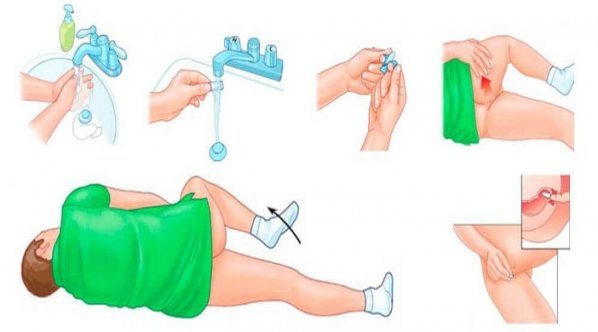
Conservative treatment
Treatment of acute hemorrhoids is not complete without the use of suppositories. Such drugs penetrate into the focus of the pathological process, as a result of which the intensity of symptoms decreases and the degree of inflammation decreases.
With the permission of a doctor, you can use the following suppositories for acute hemorrhoids:
- Hepazolon, Proctosedyl - reduce inflammation and prevent the formation of blood clots.
- Betiol, Anuzol, Ultraproct - improve the patient’s well-being, as they relieve burning, spasm and pain.
- Relief, Olestezin, Proctosan - eliminate the pain syndrome that occurs with hemorrhoids.
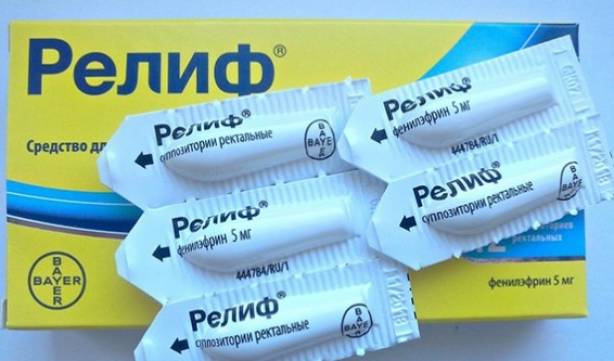
Suppositories are inserted into the anus. The patient will need to lie on his side, and then insert the suppository at a short distance - about 3 cm. After the procedure, it is recommended to remain in a supine position for half an hour, since during this time the drug will dissolve, be absorbed and have a therapeutic effect. If the patient does not follow the recommendation, then the melted suppository may flow out of the anus, which is why there will be no positive result.
Preparations for local treatment of hemorrhoids are ointments that are used to treat the area around the anus. Such remedies prevent the development of the inflammatory process, improve the patient’s well-being and prevent the spread of infection.
Your doctor may prescribe the following ointments for hemorrhoids:
- Troxevasin - prevents the formation of thrombosis, because it has a positive effect on local vessels.
- Posterisan - eliminates unpleasant manifestations of the disease and increases the tone of capillaries and veins.
- Levomekol - fights inflammation and eliminates infection that causes exacerbation of hemorrhoids.
- Bezornil - relieves pain and itching.
- Methyluracil - promotes restoration and healing of damaged tissues.
- Hepatrombin G - normalizes metabolic processes, activates the tissue healing process and reduces inflammation in hemorrhoids.
- Heparin - prevents the formation of blood clots, improves blood flow and relieves pain.
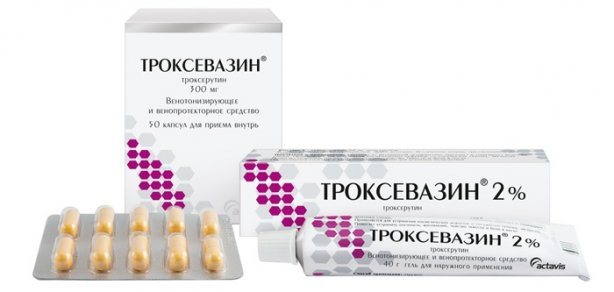
How to relieve acute pain is a popular question, because unpleasant sensations are hard to endure, so you want to get rid of them quickly. Medicines for hemorrhoids in the form of tablets are aimed at eliminating pain. Painkillers are:
- Ibuprofen;
- Diclofenac;
- Nise;
- Ketorol;
- Ketanov;
- Paracetamol;
- Voltaren;
- Analgin.
Medicines to relieve pain from hemorrhoids are allowed to be used after receiving doctor's recommendations.
Surgery
Surgery is prescribed for frequent bleeding and an increased likelihood of node thrombosis. The following methods of intervention for hemorrhoids are used:
- Open hemorrhoidectomy using the Milligan-Morgan method. Prescribed in the presence of complications: paraproctitis, anal fissures. Thanks to this procedure, the inflamed node can be removed. After the intervention, the wounds remain open, so patient monitoring is required.
- Resection using the Longo method. Excision of a small area of the rectum, after which the prolapsed nodes are tightened and fixed. For this reason, they begin to be poorly supplied with blood, which leads to the disappearance of the inflammatory process. The event lasts only 30–50 minutes.
- Closed hemorrhoidectomy using the Ferguson method. The procedure is similar to an open type of operation, however, after the intervention the wound is sutured, so the patient’s recovery is faster.
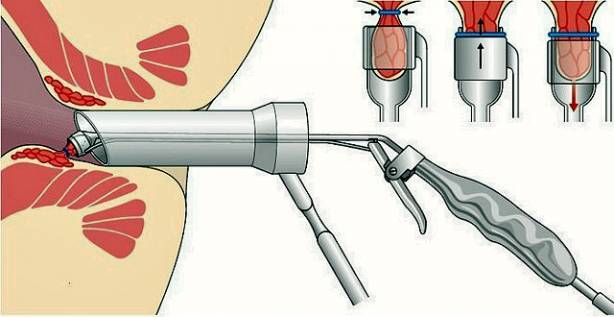
In medicine, minimally invasive methods of surgery are gaining popularity, as they are characterized by a short rehabilitation period, the absence of complications and high efficiency. Such methods for eliminating hemorrhoids include:
- Infrared coagulation is the cauterization of the hemorrhoidal pedicle using a special lamp that emits light at a high temperature.
- Cryodestruction is the effect on the tissue of a node using low temperatures. Liquid nitrogen is used as a freezing agent. As a result of the procedure, the affected tissues die and inflammation stops.
- Suture ligation is ligation of the arteries supplying the hemorrhoid.
- Ring ligation is a technique designed for ligating vessels using latex rings. As a result, the node's power supply stops, so it dies.
- Sclerotherapy is the use of agents with a sclerosing effect. This manipulation leads to the death of the hemorrhoid.
Folk recipes
Traditional medicine complements conservative therapy methods. Before starting to use such medications at home, you should consult your doctor. This will eliminate the presence of allergies to the components of the recipes and avoid other adverse reactions.
Recipes for oral administration have anti-inflammatory and analgesic effects:
- Herbal infusion. Poplar buds, mint and sage leaves, as well as yarrow, chamomile and calendula flowers are mixed in equal proportions. For the product take 2 tbsp. l. mixture and pour 0.5 liters of boiling water. The medicine is left overnight, covering the container with a lid. The drug is taken 3 times a day before meals.
- Infusion of raspberry leaves. You will need to take 50 g of the ingredient and pour 1.5 liters of boiling water. The remedy for the treatment of hemorrhoids is infused until it cools, after which it is consumed before meals. The resulting amount of drink is distributed evenly throughout the day.
- Infusion of carrot tops. Grind 30 g of the component, then pour in 1 liter of boiling water. The medicine is infused for 30 minutes. To get rid of the symptoms of hemorrhoids, take the drug 3 times a day.
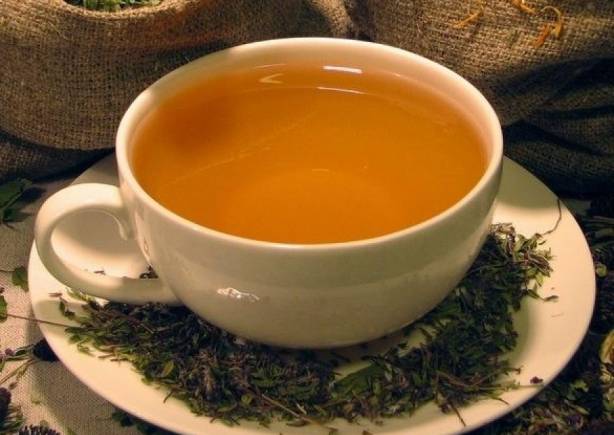
To help the veins work effectively, you need to use recipes with angioprotective properties. An additional effect of such drugs is to reduce the risk of bleeding. The following recipes are used:
- Dry 50 g of hazel leaves and pour 0.5 liters of boiling water over them. The product must be left to cool. The infusion is filtered and consumed 4 times a day.
- Take horse chestnut fruits in the amount of 50 g. They are crushed, then pour in 0.5 liters of vodka. The medicine is infused for 14 days, placing the vessel with the tincture in a dark place. The drug is taken before breakfast. For treatment take 1 tbsp. l. medicine and dilute with half a glass of water.
If you have to deal with constipation, then suppositories will help get rid of them. There are several recipes for making them:
- Take carrots, potatoes or beets, then cut out a small candle from them. The suppository is smeared with sea buckthorn oil, then inserted into the anus before bed.
- You can use beeswax, from which improvised candles are made and inserted into the anus at night. This remedy not only improves the process of bowel movements, but also reduces inflammation and normalizes well-being.
- Mix starch powder, milk and mumiyo in equal quantities. Then add a small piece (40–50 g) of melted butter to the mixture. The ingredients are mixed again and frozen in the freezer. After this, small candles are formed from the frozen mass, which are used every day before bed.
To eliminate pain and inflammation from hemorrhoids, you can use ointments prepared by yourself. There are several recipes:
- Mix crushed oak bark, toadflax flowers, pepper knotweed herb in equal proportions, then melt the lard and add the ingredient to the herbal mixture. Place the product on low heat and cook for 1-2 hours. After this action, carefully filter the medicine and wait until the mass hardens. The resulting ointment is used 2 times a day, applying a small amount of the product to the inflamed areas.
- Mix 10 g of Vaseline and 5 g of calendula tincture. The resulting amount of ointment is used 2-3 times during the day.
- Add cinnamon to the honey, taking the components in equal quantities. The area around the anus is treated with this product 2-3 times a day.
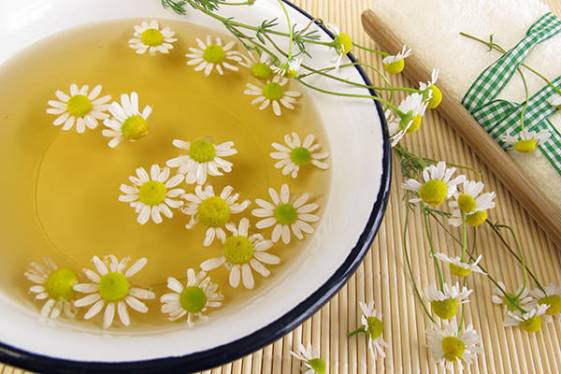
Using baths is another way to treat hemorrhoids. The following types of procedure are used:
- Cold ones are useful during an exacerbation. Thanks to the event, pain is reduced, and the likelihood of bleeding and node thrombosis is reduced. The water temperature does not exceed +20 °C.
- Warm baths are necessary for the healing of cracks and help get rid of the signs of hemorrhoids. Water temperature is about +36 °C.
- Hot procedures are prescribed to eliminate the inflammatory process. In addition, their benefit lies in enhancing the restoration of damaged tissues. Water temperature - no more than +40 °C, because the skin in the anal area is delicate and therefore easily injured
Treatment of hemorrhoids using baths is carried out in the following way:
- Use only boiled water, which is poured into a basin.
- Add medicinal components.
- They sit down in the bath.
The duration of this procedure is from 10 to 20 minutes. The following are used as medicinal components to eliminate hemorrhoids:
- Chamomile decoction or infusion.
- Potassium permanganate.
- Burdock root decoction.
- A mixture of dried herbs, consisting of St. John's wort, chamomile, calendula, sage.
- Onion peels.
- Crushed oak bark.
- Plantain or celandine leaves.
Diet
A diet is selected for the patient to avoid complications of hemorrhoids, as well as to improve well-being. It is recommended to exclude the following foods from the diet:
- turnip;
- radish;
- potato;
- blueberries;
- rice;
- horseradish;
- semolina;
- pasta;
- mayonnaise;
- pork;
- wheat bread;
- mushrooms;
- smoked chicken;
- fatty foods;
- marinades;
- salt and other spices;
- coffee.
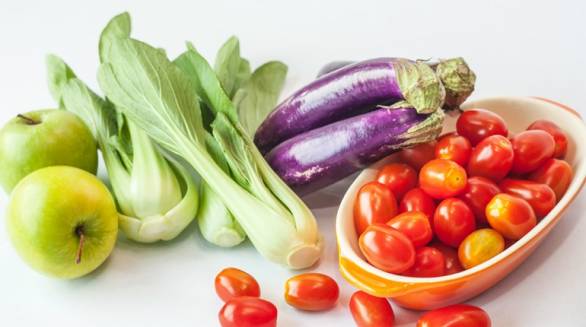
List of permitted products:
- mineral water;
- pumpkin or tomato juice;
- instant chicory;
- veal;
- beef;
- rabbit meat;
- cottage cheese;
- yogurt;
- sour cream;
- bran or rye bread;
- Wheat groats;
- dried apricots;
- figs;
- bananas;
- plums;
- pumpkin;
- cabbage;
- carrot.
Products are boiled, baked, stewed or steamed. The menu and meal schedule are drawn up together with the doctor, who takes into account the patient’s condition, the course of hemorrhoids and existing complications.
Traditional medicine methods for exacerbation of hemorrhoids
The question of how to treat acute hemorrhoids can also be answered by another type of medicine – alternative medicine. If you recognize folk remedies as a method of treatment, you can find many options for help in this type of medicine. Some remedies actually help reduce pain. But we should not forget that self-medication can only worsen the situation. Therefore, before using this or that folk advice, be sure to consult your doctor about this.
- The most popular remedy for combating hemorrhoids in folk medicine is garlic. It has been actively used for many hundreds of years to combat this unpleasant and painful problem. The simplest way available to everyone is as follows. One peeled clove of garlic is inserted into the anus. This should be done before bed so that the garlic remains in the rectum all night. It will be removed from there without any problems during the next trip to the toilet.
- There is another method of treatment associated with garlic, although it requires a little preparation. It includes making candles from garlic and butter. To do this, the garlic cloves need to be crushed in any way to a pulp. Then mix it with oil and cool. Make small candles from the resulting material. Their sizes should be within reason, of course - an example would be the sizes of ordinary medical candles. After this, homemade candles need to be cooled in the refrigerator. Thus, the effect of the manufactured product will be enhanced by temperature.
- Also a folk method associated with the same use of low temperatures is treatment with ice. Cold helps relieve inflammation. And to do this, you just need to create the same rectal suppositories from ice. Read the rest of the folk remedies by following the link.
At home
Traditional medicine methods will help improve the condition during exacerbation of the disease. However, before using them, you need consultation and approval of your doctor.
- Candles made from raw potatoes. They have a hemostatic and anti-inflammatory effect. Before using them, it is recommended to do a cleansing enema. You need to cut a candle from a potato tuber, as thick as a finger, no more than 5 centimeters long, and carefully insert it into the anus. It is advisable to carry out the procedure before bedtime.
- Cold candles. Eliminate pain and stop bleeding. To make them at home, you need to prepare rubber fingertips or small cone-shaped molds. They should be filled with water or a decoction of medicinal herbs and placed in the freezer. Before use, the form with suppositories must be dipped in hot water for 2-3 seconds, and then taken out the suppository and carefully inserted into the rectum.
- Candles made from raw carrots. They have a wound-healing and bactericidal effect. You need to cut a candle out of a carrot and use it in the evening before bed. To enhance the healing effect, you can lubricate the candles with honey or sea buckthorn oil.
- Microclysters from decoctions of medicinal herbs. A decoction of bird cherry berries, oak bark and chestnut fruits has an astringent and hemostatic effect. Microclysters with such healing decoctions will help eliminate burning, inflammation and itching.
- Calendula infusion. Has a restorative and healing effect. The product is used for enemas, compresses and washes, it is added to sitz baths and ice suppositories are made with it.
At home, it is recommended to use decoctions of nettle, sage, yarrow, and blueberries.
Tansy steam baths will help relieve acute manifestations of hemorrhoids. This procedure also has an antiseptic and anti-inflammatory effect.
Prohibited foods for acute hemorrhoids
Diet for acute hemorrhoids is an integral part of all treatment. Any medical procedures will not have the desired effect without strict adherence to all nutritional recommendations of doctors. Everything must be done to prevent problems with the digestive system - constipation and diarrhea. They will have an extremely adverse effect on the course of the exacerbation and can serve as an intensifier of painful sensations.
- At first glance, it may seem that with acute hemorrhoids you can’t eat practically anything. After all, from your diet you need to exclude all fatty, pickled, salted, smoked, fried and flour products, as well as fast food. In fact, finding a replacement for such dishes is not so difficult. It is much more difficult to treat complications of the disease.
- As mentioned above, it is worth maximizing the amount of fiber in the food you eat. It is found in vegetables, fruits, dairy products
- There are no special restrictions on fluid intake. It is important that it enters the body in sufficient quantities (one and a half to two liters). Meals should be increased to about five times a day, eating in small portions.
There are times when the diet does not give the desired effect and constipation still appears. In this case, this trouble is treated with a number of laxatives - Regulax, Forlax, Prelax, Guttalax. The latter is also allowed for pregnant and lactating women.
How to treat acute hemorrhoids?
The first question that interests patients with acute hemorrhoids is what to do and how to treat it. But in this case, any amateur activity is unacceptable. At the first signs of an acute attack of the disease, you must consult a professional - a proctologist. In district clinics, this specialist is not always on staff, so his duties are performed by a surgeon.
The main task of treatment for hemorrhoids, which is in the acute stage, is to relieve pain, which in turn will alleviate the patient’s condition.
Treatment of hemorrhoids in the acute phase can be medicinal, surgical or combined, that is, a combination of the first two methods. Also, with the permission of the treating doctor, the main antihemorrhoidal treatment can be supplemented with the use of folk remedies that will speed up recovery.
Drug therapy
To relieve pain in the anus, specialists use drugs that contain anti-inflammatory substances and local anesthetics. The choice of medicine is made based on the type of hemorrhoids.
For external hemorrhoids, ointments, gels or creams are used, and for rectal localization of the pathological process, rectal suppositories. Tablet drugs are also prescribed to treat an acute attack of the disease, but local dosage forms allow you to quickly achieve the desired result.
For internal hemorrhoids, the following suppositories are most effective:
- Proctosan;
- Procto-Glyvenol;
- Relief Advance;
- Anestezol.
The listed rectal suppositories contain local anesthetics, which quickly relieve pain, itching and burning in the anus. Rectal inserts can also be used, which contain belladonna extract, which has pronounced antispasmodic and analgesic effects.
In case of severe inflammatory process in the anus, preference is given to suppositories that contain hormonal substances, since they have strong anti-inflammatory, antipruritic and decongestant therapeutic effects. Such drugs are Proctosedil M suppositories, Relief Ultra and Ultraproct.
With anorectal thrombosis, there is a need to use drugs with heparin, which is an anticoagulant, that is, it resolves blood clots. In this case, the suppositories of choice may be Hepatrombin G and Nigepan.
For acute external hemorrhoids, it is more convenient to use antihemorrhoidal ointments, although most ointment products can also be administered into the rectal canal.
For anorectal thrombosis, ointments such as Hepatrombin G, Troxevasin or heparin ointment are prescribed. If an attack is accompanied by severe pain, you can use Relief Advance, Proctosedyl, Ultraproct, Aurobin and others ointments.
Local antihemorrhoidal therapy is combined with the use of tablet drugs that have phlebotonic and angioprotective therapeutic effects, namely:
- Detralex;
- Troxevasin;
- Venarus;
- Phlebodia 600.
The listed drugs increase the tone of the veins of the anus and act directly on the cause of hemorrhoids - venous insufficiency.
In case of severe pain, to alleviate the patient’s condition, the proctologist may prescribe painkillers such as Pentalgin, Nimesil, Ketanov, Ibuprofen and others. If painkillers are ineffective, novocaine blockades can be performed.
If an acute attack of hemorrhoids is accompanied by constipation, laxatives are used, the most effective of which are Dufolac and Normaze.
Surgical methods of treatment
In cases where conservative therapy fails, the specialist considers surgical intervention. When choosing a surgical method, preference is given to minimally invasive techniques, since they are painless, quickly performed and do not require a long rehabilitation period.
For anorectal thrombosis, a thrombectomy operation is performed, during which the hemorrhoid is opened and the clot is removed.
After stopping the acute inflammatory process, the following minimally invasive operations can be performed:
- sclerosis of nodes, when a substance is injected into the hemorrhoid using a needle, which glues its walls;
- ligation of nodes with latex rings, when a latex ring is placed on the neck of the nodule with a ligator, which compresses the vessels supplying the formation, as a result of which it dies;
- cryodestruction of a hemorrhoid, when it is destroyed using liquid nitrogen;
- disarterization of the hemorrhoid, when the vessels that supply it with blood are tied with threads;
- photocoagulation and laser coagulation, when nodules collapse under the influence of infrared/laser rays.
In advanced stages of hemorrhoids, the only way to get rid of the disease is radical surgery. The classic operation for hemorrhoids is the Milligan-Morgan hemorrhoidectomy.
Unlike minimally invasive surgical techniques, hemorrhoidectomy is performed only in a hospital setting under general anesthesia and requires long-term rehabilitation. Therefore, there is no need to take your condition to extremes and seek help from specialists in the early stages of hemorrhoids.
Traditional medicine
As we have already said, folk remedies can only be used in consultation with the treating doctor and only as a supplement to the main antihemorrhoidal treatment, since it is impossible to get rid of hemorrhoids only with the help of traditional medicine.
The following folk remedies will help alleviate the condition and speed up recovery during an acute attack of hemorrhoids:
- sea buckthorn oil . This natural remedy can be used as an ointment on the external bumps, or applied rectally by soaking a cotton swab in it;
- ice candles . To prepare such candles, use ordinary water or decoctions of medicinal plants, such as nettle, yarrow, oak bark, chamomile, kidney herb and others. The effectiveness of using herbal infusions in this case will be higher;
- Rectal inserts made from raw potatoes . Small cylinders cut from potatoes are inserted into the anus 1-2 times a day. The starch released from such suppositories perfectly stops bleeding and relieves inflammation;
- cool baths . For baths, you can use cool solutions of potassium permanganate, sea salt, mumiyo or infusions of medicinal plants. With this procedure you can quickly stop bleeding, relieve pain and inflammation in the anus.
Several more auxiliary methods for the treatment of acute hemorrhoids
The longer the list of measures you take against the disease, the faster you will say goodbye to it, if not forever, then for a long time. Following a number of additional recommendations will help you quickly get rid of pain and discomfort, inflammation and discomfort.
- A simple enema is a good help in this matter. It will quickly cleanse the intestines and reduce the load on the digestive tract. Treatment of hemorrhoids without it is practically impossible.
- Personal hygiene becomes incredibly important during this period. Toilet paper should be replaced with wet wipes and, if possible, immediate washing. For the latter, cool water is better, since it has a beneficial effect on inflammation using the same low temperature.
- Any physical exercise is now necessary for your body like air. Exclusion of physical activity will have a detrimental effect on the condition of the body. After all, pain intensifies due to stagnation of blood in the pelvic area. Light gymnastics and a short warm-up will help prevent this - of course, as far as possible given the condition.
- Reduce stress on the rectum as much as possible. To do this, you should not sit for a long time, especially on a hard or uncomfortable surface. When sleeping, it is advisable to choose a position facing up.
All of these auxiliary methods are quite simple to use, but they can provide invaluable assistance in the treatment process.
Of course, I would also like to emphasize the importance of consulting a doctor. Only a specialist can accurately determine the stage of development of the disease and prescribe the most suitable treatment for you. Ignoring a trip to the doctor and trying to treat an exacerbation of hemorrhoids on your own can only make things worse, complicate and prolong the healing process.
Prevention
Useful recommendations will help prevent exacerbation of the disease:
- Eat a diet high in fruits and vegetables that are rich in dietary fiber and fiber. This will help normalize intestinal function.
- You need to give up alcoholic beverages, smoking, fatty, smoked, spicy and pickled foods.
- Move more, run in the morning and walk. Active movements accelerate the blood and prevent it from stagnating in the pelvic area.
- Avoid heavy physical activity.
- After each bowel movement, perform hygiene procedures by washing the anus with cool water. This strengthens the walls of blood vessels.
- Perform special exercises aimed at strengthening the abdominal and pelvic floor muscles.
